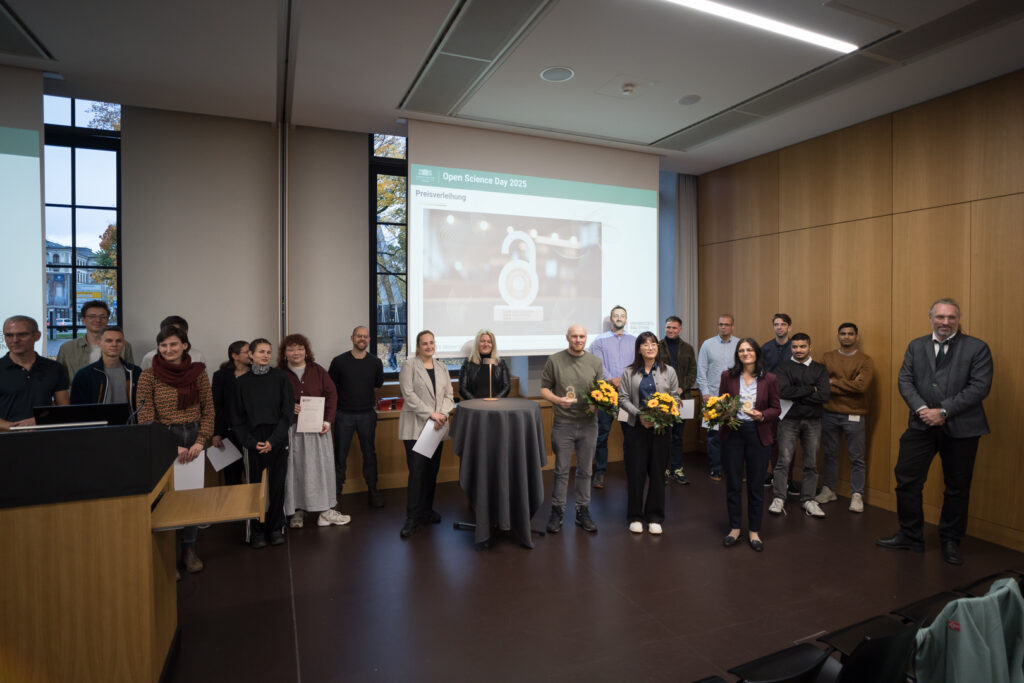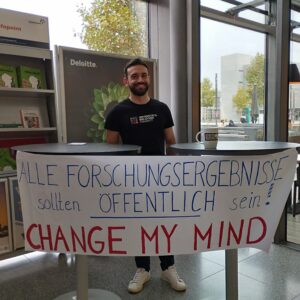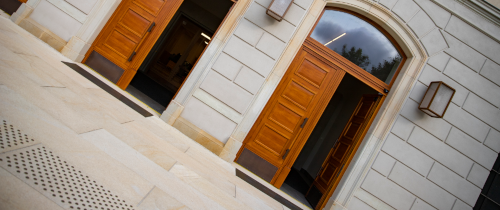In the following of the Open Science Week 2025 and the conferment of the Open Science Award, we look back on an eventful week.
The Open Science Team of the University Library, the project D2C2 and the ACROSS Alliance jointly have designed a varied program. In addition to interesting presentations, there were also offered opportunities to participate in several actions like “Change my mind” and an Open Science quiz.
The highlight was the conferment of the Open Science Award (photo). Potential awardees had the opportunities for self-proposal or to be proposed by another person. All nominated persons subsequently submitted an own application.
The number of impressive applications has surprised and amazed us completely.
It appeared almost impossible to only select 3 of them for the award.

However, as not all of them could have been conferred an award, we attach importance to give an overview of all projects in their uniqueness again. The descriptions of the projects were mainly taken from the proposals submitted resp. from the presentations. We assume that the respective contact persons would be delighted to give detailed information.
[The following order does not correspond to an assessment of the contributions]
StochasticDominance is a Julia Open-Source-package for enhanced decision-making in financial options and enables an efficient verification and optimization under stochastic dominance conditions of higher order. By the reduction of infinite conditions to a finite set, the tools makes innovative methods for decision-making accessible and practicable for researchers and practicians. (Rajmadan Lakshmanan & Prof. Dr. Alois Pichler)
The “PartWiss” Guideline for participation in research was collaboratively designed by more than 150 persons involved. It describes crucial aspects in ten action fields. It has for objective to provide practical guidance and orientation regarding the variety of participative approaches and terms. It is designed as a didactically appealing set of cards for modularly use. The respective cards include additional practical information and indications regarding further materials. (Jun.-Prof. Dr. Andreas Bischof)
The science-podcast „Linguistics Behind the Scenes” describes a particular manner for drawing attention on research and to make it step-by-step accessible for the grand public. It has for objective to generate interest for linguistic issues, to inform at the same time by the way about scientific methods and to teach important contents of the research in a comprehensive manner. Via links in the shownotes to Spotify etc., interested persons may read almost all publications used in order to develop their own point of view. A number of articles and book contributions used were published as secondary publications in the repository MONARCH-Qucosa. (Prof. Dr. Christina Sanchez-Stockhammer)
PhD-project “Digitally Created Body Positivity”: Ms. Yeo understands her doctorate in a holistic manner with regard to Open Science and teaches her experiences as scientific staff member to students. In her research project, she frequently faced the challenge of limited access to information. Materials available were not varied enough, were not sufficiently comparable and limitedly replicable. For this reason, she has collected comprehensive data, has elaborated sample stimuli and has stored them on OSF (Open Science Framework). All empirical projects were pre-registered. Assumptions, design and analytical procedures as well as exclusion criteria were openly published. For the materials she has assigned the most open Open Access license CC BY 4.0. Within her entire research process, she exclusively published Open Access. This approach is also for a part mandatorily applied within the supervision of final theses but also comprehensively supported by the students. (Jiyeon Yeo)
BirdNET: It his hardly necessary to explain this project. With more than 2 million active users of the app integrated in more than 80 research projects, it counts among the most popular research projects of Chemnitz University of Technology. The artificial neuronal network is able to distinguish more than 6.000 bird species, provided by a free license and serves as base for a variety of freely-accessible Open-Source-solutions. With this tool, the transdisciplinary and international team contributes significantly to the protection of biodiversity. Unique in comparison to other AI-systems is the transparency and reproducibility. The barrier-free and low-threshold access enables the reception by professional research as well as by biologists, environmental organizations and citizen-science-projects. (Dr. Stefan Kahl)
The research of Ms. Morgenstern is in the field of spin dynamics in organic molecules and she publishes all her results Open Access. She serves as model for the open provision of measuring data, analytic scripts and the complete measurements as well as the corresponding analytic procedure on GitHub. These activities are a role model for Open Science in organic electronics. They enable the complete reproducibility and transdisciplinary reusability in the fields of physics, material sciences and engineering. In addition, she has introduced the electronic lab-book elabFTW in the researchers group in order to assure a standardized and FAIR-complying documentation of data. This approach breaks with the traditionally closed practices in that field and demonstrates how transparency and accessibility may enhance scientific progress. (Annika Morgenstern)
From February to November 2024, the online panel-study regarding the influence of Deepfakes on the reception of democratic processes and polarization was implemented. The questionnaire for the survey as well as the analytic plan was pre-registered on OSF. The ethical evaluation of the project is openly accessible. A manuscript, including replication-scripts, data sets and code-book are currently in review. The data set was made known within the Community and researches get access to the data subsequent to pre-registration of their research issue. The project was initiated solely by junior researchers without third-party-funding. It serves as role model for collaborative, accessible research and active promotion of Open Science in the social sciences. (Klara Marie Steinmetz)
“Frontiers in Neurorobotics” is the only Open Access-journal in the field of neurorobotics world-wide. After challenging initial years, it had been established successfully thanks to a high quality of the articles published and has reached an Impact-factor of 2.8, a CiteScore of 6.1 and 25,138 citations in total. Prof. Röhrbein counts among the main editors of this journal and serves as contact person for a variety of editors and reviewers. Thus, the contributes significantly to the global enhancement of research by Open Access and proves that Open Access (Open Science) may be related to highest quality. He already reported his experiences to the ERC-president and the president of the German Rectors’ Conference. (Prof. Dr. Florian Röhrbein)
Since nearly four years, the Professional Learning Community Open Science establishes Open Science (OS) in teaching by an innovative “Students as Partners”-concept. Presentation Packages elaborated as Open Educational Resources (OER) familiarize psychology students with OS-principles from the first day on. Pre-registration workshops create direct relations to practice. In an extracurricular way, the Journal Club and the Instagram-Account focus on the societal relevance of OS-contents and address directly to students, lecturers and researchers. Thanks to the perfect mixture between teaching, peer-learning and science communication, the psychology students are introduced in a targeted manner to transparent science. (Kathrin Fucke)
The Digital Health Application (DiGa) Mawendo is a therapeutic program for training at home. The training programs include exercise videos and are state-of-the-art. A team of the Professorship for Research Methods and Analytic Procedures in Biomechanics has managed to prove that the DiGA is superior in comparison with the standard therapy (physiotherapy). Exclusively in that way, the inclusion in the DiGA-index was possible. The decision was based on the study report of the project published on MONARCH-Qucosa. An English version was published with license CC BY 4.0 in the “Journal of Medical Internet Research”. The successful registration in the DiGA-index enables now the assumption of costs for the therapy by the health insurance for a number of insured persons. (Dr. Tobias Mayer-Roth)
By the publication of a study regarding the research data management (RDM) at German universities in a Diamond-Open-Access-journal, the research project serves as model in the field of economics. The journal “M@n@gement” is the first Open-Access-journal for management, strategy and organizational theory. The publication in this journal sets an example for a consequently open scientific culture. For the first time, the article links the analysis of research data management to a critical perspective on the “neo-liberal university”. Of significant importance is the result that the ways of implementing Open Data practices is determined by the different subject cultures. RDM is characterized by competing institutional logics and designed by tensions between transparency, efficiency and competition ideals. The study opens the forum for new discussions and proves that highest scientific quality, methodical transparency and unrestricted access are compatible and being able to strengthen each other. (Christian M. Huber)
The Meta-Study regarding macroeconomic effects of conventional financial politics (MORPEP META-CMP) is probably the first meta-analysis in the field of macroeconomics which includes a comprehensive public documentation. From the pre-registration of the analytic plan, the AI-driven literature search (10,714 studies), the documentation of the data search and the coding instructions, the version check of all raw data, the intermediate steps of the elaboration of data sets, the data extraction up to the final analysis all information are accessible for the public. The example demonstrates impressively how meta-analyses may be implemented in a transparent and reproducible manner. The experiences are shared beyond the subject area and serve as orientation for the research community. (Dr. Franz Prante/ Prof. Gechert)
The digital, commented and from a historical-critical perspective driven edition of the novel “Ahasver” (1981) of Stefan Heym represents a valuable contribution to the dissemination of this significant literary work. The project provides for the first time comprehensive insights in the state of documentation and includes detailed comments and analyses. The project provides low-threshold and intuitive access opportunities for varied groups of users. The Open Access entry is possible via the three sections textual level, communication level and deliverance level. Target groups are the philologic community as well as all interested readers. (Tobias Frank)
The anthology regarding Chemnitz as Capital of Culture 2025. Sociospatial investigations describes the research contribution of Chemnitz University of Technology to the year of Capital of Culture and transfers scientific results dealing with the theme to the grand public. It includes local civic activities and shows the strong commitment of Chemnitz University of Technology for the city, the region and the event. The communicative manner of Open Science implemented here enables the society to take part in research and to profit from different expertise. In addition, chances for societal dialogue are opened which is particularly in times of growing scepticism towards science of high importance and may enable to strengthen trust in research. The volume was published Open Access via the Digitization Program of the State of Saxony. (Dr. Ulf Bohmann & Jun.-Prof. Dr. Thomas Laux)
Research project regarding the acceptance of second-hand products (as gift). The results discover a societal habitude being opposed to second-hand gifts and explore situations when consumers are nonetheless willing to give second-hand products as a gift. Materials, data, analytic codes and reports of results can be made openly accessible and findable by provision on Open Science Framework (OSF), the assignment of metadata and prospectively DOIs. The OSF-project is designed in a way to make it internationally comprehensible and easily usable. The files are stored in a structured way and named. Analytic codes in the openly available programming language R assure that analyses are interoperable and reproducible. In addition, pre-registrations enable a separation of confirmatory and explorative analyses. (Juliane Weidenhagen)
The project „With LLMs towards informative metadata” addresses the crucial challenge of working with open data. In the best case, those are described in a manner to be findable and reusable for all. Within the project, open language models (Open Source LLMs) are used for generating automatically DCAT-complying metadata. This reduces manual efforts, enhances the quality and consistency and makes open data easier findable for administration, research and civic society. The activity links Open Access, Open Data and Open Source in an ideal way. The approach is very well reproducible and easily transferable on different application scenarios (repositories, OER…). (Björn-Lennart Eger)
For the project „To know, what goes wrong”, funded by the German Research Foundation (DFG), 5 experiments in total were implemented during the last 3 years having for objective to get to know more about the human perception and acting in a transparent and reproducible way. In that way, comprehensive, multimodal and high-definition time series of behavioral data are made accessible on a field where normally exclusively aggregated data are available. At the same time, detailed analytic scripts and descriptions are made available enabling to work with datasets independently, whether in other contexts, with other analysis or modelling approaches or for replication. This is particularly valuable because the measuring data were raised with very precise, specialized high-tech equipment and high personal resources. In addition, the publication of preprints provides a direct access to state-of-the-art research and makes the publication process transparent at the same time. (Dr. Karl Kopiske)
The project BioFab Vending – Sustainable 3D-printing from Organic Waste transforms all-day kitchen waste in biodegradable one-way products, such as cups, plates and spoons. The fully-automatic hardware-system sorts out by means of sensors and image-processing appropriate waste, dries and shreds them, mixes them with biodegradable PLA, pelletizes them and prints the selected article in 3D. The objective consists on enhancing the circular economy, on reducing waste and on promoting sustainable consumer behavior. (Pranav Avinash Khadkotkar & Saswat Pradhan)
Within the ERC-project ACTIONS, a strategy for Open Science was developed and implemented at the Professorship for Electrochemical Sensors and Energy Storage. It includes Gold Open Access-publications, the publishing of corresponding datasets, the elaboration of an ERC-complying data-management-plan and regular trainings. To be highlighted should be the processing of datasets according to the FAIR-principles causing significant additional efforts and not being implemented in that manner on the field of natural sciences that frequently. This holistic Open Science-strategy serves as model for other researchers groups and assures evidence-based scientific work. (Dr. Markus Gößler & Prof. Dr. Karin Leistner)






